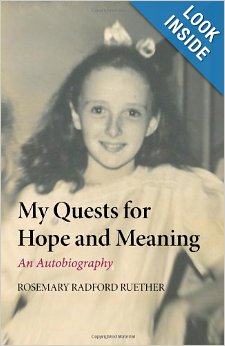 Rosemary Radford Ruether is one of the most brilliant theologians of our time and her newly released autobiography, My Quest for Hope and Meaning, is a gift to those of us who have been so touched by her work. In this intimate and beautiful piece, Ruether shares her personal journey in feminist scholarship and activism. The autobiography opens with a profound forward by Renny Golden (that is also shared here on Feminism and Religion) and continues with an introduction and six chapters where Ruether guides us through an exploration of the influence of the matriarchs in her life, her interactions with Catholicism, her continued exploration of interfaith relations, her family’s struggle with mental illness, and her commitment to ecofeminist responses to the ecological crisis.
Rosemary Radford Ruether is one of the most brilliant theologians of our time and her newly released autobiography, My Quest for Hope and Meaning, is a gift to those of us who have been so touched by her work. In this intimate and beautiful piece, Ruether shares her personal journey in feminist scholarship and activism. The autobiography opens with a profound forward by Renny Golden (that is also shared here on Feminism and Religion) and continues with an introduction and six chapters where Ruether guides us through an exploration of the influence of the matriarchs in her life, her interactions with Catholicism, her continued exploration of interfaith relations, her family’s struggle with mental illness, and her commitment to ecofeminist responses to the ecological crisis.
Ruether states that “Humans are hope and meaning creators” (xii), and her autobiography details her own quests for hope and meaning. She reflects on the incredible impact made by the female-centered patterns in family and community in her life. According to Ruether, these “matricentric enclaves” grounded and shaped her interest in feminist theory and women’s history. She also describes the spiritually and intellectually serious Catholicism that she received from her mother and articulates her continued frustration with Vatican leadership that has undermined the efforts of Vatican II. For Ruether, her ongoing affiliation with feminist theological circles is crucial as she continues to work toward shaping an ecumenical and interfaith Catholicism.
In Chapter 3, “The Warring Children of Abraham: Jews, Christians, and Muslims,” Ruether details her relationship with her Jewish uncle and the impact this had on her commitment to exploring the interrelationship between these three traditions. She describes her continued efforts within her own community to shape theological education and work for peace across religions. In Chapter 4, Ruether articulates her continued journey and interest in Greek and Ancient Near Eastern paganism and participation in Christian-Buddhist dialogue.
 In Chapter 5, Ruether turns her attention to her family’s struggle with mental illness and the failures of the mental health system. Here, she questions the relationship between the mind and brain and the role they play in the construction of self.
In Chapter 5, Ruether turns her attention to her family’s struggle with mental illness and the failures of the mental health system. Here, she questions the relationship between the mind and brain and the role they play in the construction of self.
In her final chapter, Ruether draws on Bill McKibben’s work related to the ongoing deteriorating condition of the ecosystem. She discusses the continued threats to our global life system if we refuse to take responsibility and end patterns of domination of nature and of women. She also explores ways of living suggested by new agricultural and energy systems and asks what kind of spirituality can encourage and support a sustainable way of living together while embracing new circumstances.
Responding to requests from over the years, Ruether concludes her book with a complete bibliography of her writings including books, chapters within books, and articles from 1963 forward.
Having had the great privilege being in the classroom with Ruether, I found myself completely immersed in her latest work and continuing my journey as her perpetual student. Here, she reminds us that by imagining a God that cares, we become more caring our selves. Although we are indeed inadequate as finite beings, we can and must “do better at creating finite moments of goodness by taking responsibility for what we do” (xii). Through our own affirmations of hope and meaning we produce new boundless realities to carry life forward.
I am grateful for Ruether’s willingness to allow us a glimpse into the journey that influenced and shaped her feminism, theology, and activism. There is no doubt that her scholarship and ongoing commitment to peace and liberation has impacted the way we explore the terrain of the field of theology. Simply said, Rosemary Radford Ruether is a game changer. Her autobiography clearly demonstrates this in more ways than one.
Gina Messina-Dysert, Ph.D., is Dean of the School of Graduate and Professional Studies at Ursuline College and Co-founder of Feminism and Religion. She has authored multiple articles and the forthcoming book Rape Culture and Spiritual Violence, and is co-editor (with Rosemary Radford Ruether) of the forthcoming anthology, Feminism and Religion in the 21st Century. Her WATER Teleconference, “In Search of Healing: Confronting Rape Culture and Spiritual Violence,” can be accessed here. Gina’s research interests are theologically and ethically driven, involve a feminist and interdisciplinary approach, and are influenced by her activist roots and experience working with survivors of rape and domestic violence. Gina can be followed on Twitter @FemTheologian and her website can be accessed at http://ginamessinadysert.com.


Reblogged this on Take What You Need and commented:
For me, too, this woman was instrumental in the transformation of my faith.
LikeLike
Rosemary Ruether continues her brilliant, pioneering work as a feminist scholar by contributing her own life to the history she studies. I remain deeply in her debt. I wish her many more years of productive work.
LikeLike
“Gaia and God” was an important book in my feminism and religion education. Thanks for letting us know about RRR’s autobiography. I’ll pick it up, Gina.
LikeLike